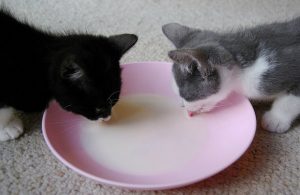Posts Tagged ‘lactose intolerant dog’
Can My Pet Be Lactose Intolerant?
 Did you know your pet can be lactose intolerant – and why this happens? We all see the commercials and the pictures of dogs and cats drinking milk out of children’s cereal bowls. But just because they eat it, does that mean it is the safe and advisable thing to do?
Did you know your pet can be lactose intolerant – and why this happens? We all see the commercials and the pictures of dogs and cats drinking milk out of children’s cereal bowls. But just because they eat it, does that mean it is the safe and advisable thing to do?
Lactose vs. Lactase
With lactose intolerance, the pets don’t possess the lactase enzyme to break down the lactose, which is a sugar. Lactase is an enzyme that breaks down and helps the digestive system to process lactose. The higher the lactose content, the less likely that your pet will be able to enjoy the aftermath, regardless of how happily it eats, drinks, or laps it up.
Without the lactase, the pet simply cannot digest the milk products and acute intestinal symptoms almost always arrive. These clinical signs can include:
- diarrhea
- abdominal pain
- bloating, nausea
- vomiting
These are all fairly typical indications of gastrointestinal distress. Sometimes a pet will drink excessive amounts of water when suffering from lactose intolerance, since diarrhea and vomiting are associated with it, causing the pet can be susceptible to dehydration.
I know that I will be presented with the argument that puppies and kittens drink mother’s milk at birth and is the primary source of nutrition for them. But as they grow older, their lactase production has decreased dramatically, therefore they do not produce enough to break down the lactose in milk. Another contributing factor is the fact that cow’s and goat’s milk have about twice the amount of lactose compared to a dog’s or cat’s milk. This high level can overpower the pet’s ability to digest it and can often lead to diarrhea.
Even though pets with milk intolerance can exhibit clinical signs, they can, under some circumstances, have some dairy products such as cheese and unpasteurized yogurt that usually have the lactose removed or broken down through bacterial actions. As a result, these products are ofter tolerated well in pets that would otherwise get diarrhea.
The general rule of thumb for pets and dairy products of all varieties is that they need to be low in lactose, low-to-no sodium, and with as little artificial preservatives and sweeteners as possible. If you feel compelled to give your pet a dairy product, do so in small amounts to establish your individual pet’s tolerance. Proceed with caution, and as with anything else, don’t hesitate to contact our office if you have any questions.
